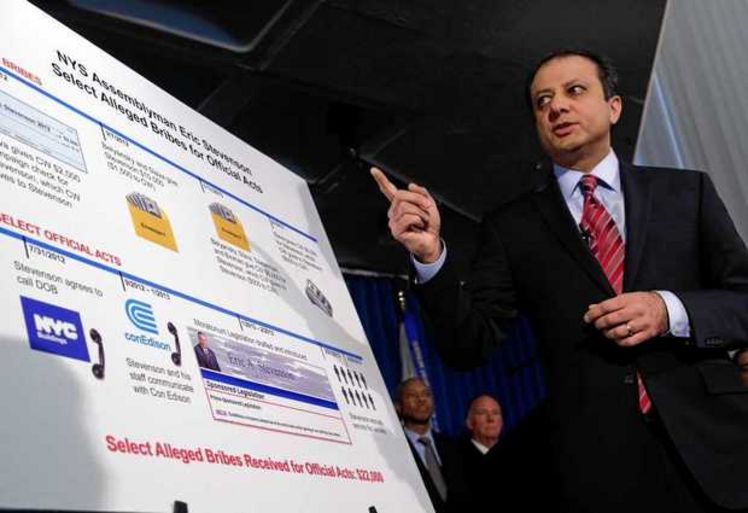The arrests of two New York state legislators and the pending resignation of a third implicated in the scandal makes the case for a wide-ranging, no-holds-barred investigation to root out what the federal prosecutor called “rampant’’ corruption in Albany.
Not a timid revamp of ethics laws. Not another commission. Not a piecemeal probe picking off a bad apple here or there. What is necessary is a coordinated dragnet to expose all the bad apples, at every level of government, and get them out of office for good.
But it can’t stop there. Albany needs permanent, structural change to reduce the opportunities for corruption. Syracuse’s experience may be instructive.
During his 16-year reign, Mayor Lee Alexander was able to rip off city taxpayers to the tune of $1.5 million using the powers of the three-person Board of Estimate, which he controlled. Through the board, Alexander steered no-bid contracts to his cronies in exchange for kickbacks. After the mayor went to prison, Syracuse voters made sure corruption on such a scale could not happen again. They instituted term limits for the mayor, eliminated the Board of Estimate and granted contract approval power to the democratically elected Common Council.
Prosecuting Alexander took a significant commitment of time and resources from the U.S. Department of Justice, the Federal Bureau of Investigation and the Internal Revenue Service. Why isn’t that happening now in Albany?
The Legislature and Gov. Andrew Cuomo blew their chance to significantly change how Albany works last year when lawmakers redrew district lines based on the decennial census. After initially promising to veto the gerrymandered maps produced by the Legislature’s hand-picked commission, Cuomo relented — in exchange for lawmakers agreeing to nonpartisan redistricting the next time around, in 2020. “I failed, I failed,’’ the governor confessed to The New York Times.
That’s why it feels a bit empty to urge voters simply to choose better candidates. They can’t. Districts are rigged to protect incumbent lawmakers, who get re-elected over and over again, accumulating more campaign money and more power. Politicians in “safe seats’’ don’t fear consequences at the ballot box, and that only reinforces the notion they can act with impunity.
Seeing dozens of their former colleagues carted off to jail hasn’t been a deterrent, either. If anything, these corruption defendants are as brazen as ever.
According to the criminal complaints (PDFs here and here), Sen. Malcolm Smith is accused of arranging bribes to advance his ambition to be mayor of New York City. He denies it. Assemblyman Eric A. Stevenson, D-Bronx was accused Thursday of taking bribes from a developer of adult daycare centers in New York City in exchange for sponsoring legislation to stymie its competitors. Stevenson was caught on camera stuffing money into his pants. Assemblyman Nelson Castro was granted immunity from prosecution for helping to build the case against Stevenson. He is to resign Monday.
“We are forced to consider how pervasive corruption is in state government,’’ Manhattan U.S. Attorney Preet Bharara said Thursday. Our government leaders lack the will to stop it. Outsiders bearing subpoena power and investigative resources need to come in and do it for them.
This article originally appeared on blog.syracuse







